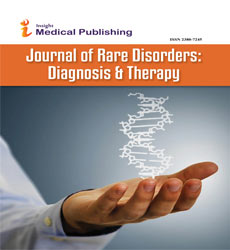Urea Cycle Disorders
Sophia Roberts*
DOI10.36648/2380-7245.7.6.e234
Managing Editor, Journal Rare Disorders: Diagnosis & Therapy, United Kingdom
- *Corresponding Author:
- Sophia Roberts
Managing Editor
Journal Rare Disorders: Diagnosis & Therapy
United Kingdom
Tel: +32466900451
E-mail: raredisorders@emedicaljournals.org
Received Date: June 20, 2021; Accepted Date: June 25, 2021; Published Date: June 30, 2021
Citation: Roberts S (2021) Urea Cycle Disorders. J Rare Disord Diagn Ther Vol.7 No.6:23.
Short Communication
A urea cycle disorder (UCD) is an inherited disease that affects how the body removes the waste that is made from breaking down protein. Urea cycle disorders (UCDs) are a group of diseases. They make it hard for your child’s body to remove waste products as they digest proteins. They are inherited diseases -- you pass them down to your child. Early diagnosis and treatment may prevent some of the adverse outcomes, which are primarily neurological [1].
Urea cycle disorders occur in 1 in 35,000 newborns. There are eight types.
• ARG1 deficiency -- Arginase
• ASL deficiency -- Argininosuccinate lyase
• ASS1 deficiency -- Argininosuccinate synthase 1
• Citrin deficiency -- Citrin
• CPSI deficiency -- Carbamoyl phosphate synthetase I
• NAGS deficiency -- N-acetylglutamate synthase
• ORNT1 deficiency -- Ornithine translocase
• OTC deficiency -- Ornithine transcarbamylase
Symptoms
Complete UCD: Fussy, Sleepy or sluggish, Can’t feed, Vomits, Low body temperature, Problems with posture, Seizures, Fast breathing that becomes slow, Coma.
Partial UCD: Avoiding foods high in protein or a dislike of meat, Loss of appetite, Nausea or vomiting, Behavior problems, including hyperactivity and Mental problems (confusion, delusions, hallucinations, psychosis) [2].
Diagnosis
Diagnosis of urea cycle disorders is based on amino acid profiles. A liver biopsy can be done to confirm the diagnosis since it can show low levels of enzyme activity. Genetic tests also can be done to show whether there is a problem with one of the genes needed to break down proteins of the urea cycle to identify the particular type of urea cycle disorder [3].
Treatment
Treatment is a lifelong process that doesn't cure the condition, but it can effectively manage the symptoms.
A team of health professionals will care for your child. They will first do these three treatments at the same time:
• Dialysis to remove ammonia from their blood
• Feeding them supplements of sugars, fats, and amino acids
• Medicines to remove extra nitrogen
Long-term treatment can manage UCD symptoms
• A low protein, high-calorie diet
• Medications to remove nitrogen
• Supplements of amino acids
• Drinking plenty of water
A liver transplant can reverse the symptoms of a urea cycle disorder.
Long-Term Outlook
There currently is no cure for urea cycle disorders. Outcomes depend on the type of urea cycle disorder, how severe it is, how early it is diagnosed and how closely the treatment plan and diet is followed [4].
References
- https://www.cincinnatichildrens.org/health/u/ucd
- https://www.webmd.com/children/urea-cycle-disorders
- https://www.msdmanuals.com/en-in/professional/pediatrics/inherited-disorders-of-metabolism/urea-cycle-disorders
- https://www.sciencedirect.com/topics/biochemistry-genetics-andmolecular-biology/urea-cycle-disorder
Open Access Journals
- Aquaculture & Veterinary Science
- Chemistry & Chemical Sciences
- Clinical Sciences
- Engineering
- General Science
- Genetics & Molecular Biology
- Health Care & Nursing
- Immunology & Microbiology
- Materials Science
- Mathematics & Physics
- Medical Sciences
- Neurology & Psychiatry
- Oncology & Cancer Science
- Pharmaceutical Sciences
